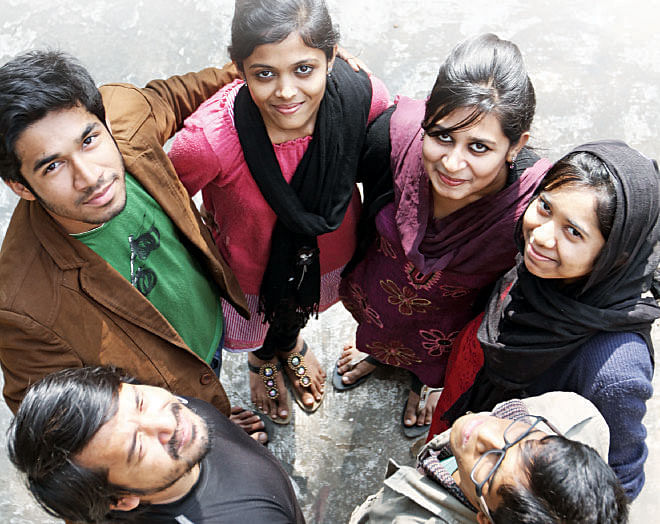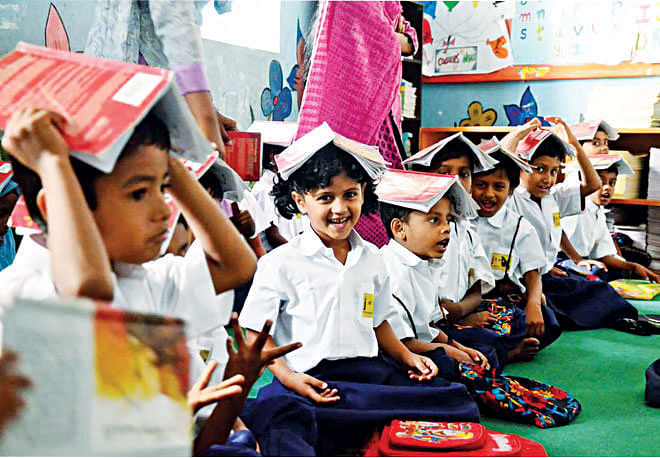FOR THE PLEASURE OF HELPING OTHERS

The young are often perceived as self-centred, preoccupied by activities that are considered fun and generally apathetic towards society's problems. Asking young people what they do in their free time we would expect them to place listening to music, hanging out with friends, playing video games or chatting on facebook to be on top of the list. Anshah Anju Khan a fresher of Dhaka University (DU), however, comes up with an unusual reply. She says, “After studies I actually pass my time with my organisation.”
Ansha's 'organisation' is a little different from the groups that the youths in the city usually form. “A few years ago, on my way to school,” she says, “I would find many children selling things in the street or simply begging for a meal. Sometimes I helped them from my little lunch pack but their hungry eyes told me that it was far from enough. This thought kept nagging my mind until I decided to launch Durnibar Foundation with a group of friends.”
Through sheer willpower and with little resources the Foundation provides warm clothes and food for the poor. It also caries out campaigns to raise awareness on various social issues such as gender equality and the right to education. Ansha and her friends' only leisure nowadays is to lend a helping hand to the poor and the helpless.
And she is not alone in her endeavour. There are hundreds like her who slowly but steadily are trying to change the society in which they live, proving once again that the human spirit has strange resilience, that when it comes to helping others, the country's youth can show the way.
It is indeed an inspiring scenario for a developing country like Bangladesh. Like Ansha, the young generation of Bangladesh has started to come up with new ideas to bring about a positive change in our society. With the country's politics in tatters, our young people are not just running in pursuit of lucrative careers. They share a dream, a dream of developing themselves, along with the society that they live in. Dr Yunus said in one of his speeches, “I'm encouraging young people to become social business entrepreneurs and contribute to the world, rather than just making money. Making money is no fun. Contributing to and changing the world is a lot more fun.”
In line with Dr Yunus's inspiring suggestion, young people are having fun while rendering their service to the community. They are forming voluntary organisations of their own with their limited resources only to change the bleaker side of our society into a greener one. Their contributions to the society prove that to help the helpless we don't need a huge amount of money. What we need is a youthful mind and an honest willpower to work.
Unlike Ansha, the volunteers of United Nations Youth and Students Association of Bangladesh (UNYSAB) work a bit differently. Samin Yasar, a member of UNYSAB says, “Each year we travel to the remote villages of our country where our help is mostly needed.” This is not limited to charitable activities such as distributing warm clothes to the destitute, the organisation also tries to initiate other youth groups to be interested in social welfare activities. “Not only that we also train up and share our experiences with the local youth groups about ways of volunteerism and social activities”, says Zisan, another member of the group.

UNYSAB is also quite popular among the youth for their innovative workshops and conferences. Recently they have arranged several workshops for the youth of the remote areas of Rangpur. To make it more effective, the volunteers of the UNYSAB engage several expert organisations to get voluntary technical support.
Saiful Islam, one of the trainees, says, “I run a community club of youths in my town. I have a dream to work for the disabled. From this training, I have learnt a lot about how we can start our initiative with limited resources.” UNYSAB has also been arranging MUN (Model United Nations) conferences each year to grow leadership skills among the youths. MUN is a conference similar to the United Nations where student participants research and formulate political positions based on the actual policies of the countries they represent.
Interestingly Ansha of Durnibar Foundation has also participated in one of the MUN conferences. She says, “It's an awesome experience. It breaks the barriers and creates uniformity among the young minds.”
Perhaps the most obvious proof of volunteerism among youth was seen after the devastating collapse of Rana Plaza when thousands of people were trapped in the rubble. Hundreds of young Bangladeshi volunteers took the lead in rescuing the victims, risking their own lives.
When the rescue operation was declared over, the volunteers of Community Action (CA) came up with a novel idea. It put forward an effective rehabilitation plan for the family of the Rana Plaza victims. With their own limited means, it has contacted the family members to distribute seven rickshaws, five vans, six sewing machines, along with some monetary support to two other families to get them started on a tailoring shop and clothing business. It has also given educational expenses of four HSC students. Nabila Idris, one of the founders of CA says, “Unlike many organisations where action time lines are relatively short, our 'actioneers' believe in working longer in order to hopefully leave long-term impact.”
Actioneer is a term CA uses to describe its volunteers. CA's initiative for the Rana Plaza victims is indeed a lesson for the big shots of our garment industry who are still haggling with the workers over a compensation scheme. CA is quite popular among the youngsters for its voluntary activities. It is also on for many young people to work for more than one organisation at a time. Take Samin, who works for both UNYSAB and the CA. He says, “When I can manage time after my study I work for my society. It's not important for which organisation I work; the important fact is what I am doing for people.”
Helping people with disability is important for the volunteers of Physically-challenged Development Foundation- (PDF). Its signature project is to make the educational life of disabled students smooth. The first thing they did was to conduct a survey among the physically challenged college and university students to find out what kind of hurdles they are faced with. Once this was known, the foundation members started helping them with stipends, special equipment such as Braille equipment and Braille typewriters, wheelchairs and so on. Mizanur Rahman Kiron, founder of the group, says, “Our vision, on which we have already started working, is to establish a one-stop service centre in each university campus for the physically challenged people. In these centres we'll provide them with full technical and logistical and other necessary trainings at minimum expense.”
Such initiatives can be examples for volunteers like Saiful from Kurigram who cherish the dream of working for people with special needs. Shamim a blind student of Dhaka University says, “I always participate in the activities of the PDF such as Chess Tournaments for the blind; they are really helpful for the students with special needs.”
What is the most important building block of a nation's development? The answer is simple: an educated population. Young volunteers of JAAGO have taken this as a serious challenge to be taken up. With a scanty resource and a handful of volunteers, Karvi Rakshand started JAAGO to educate the underprivileged children of our society. It sets up schools in the slum areas of Dhaka to ensure the right to education of the poor children. Now JAAGO has eight schools for these underprivileged children and they are ensuring quality education for as many as 1400 children. Esha, one of the volunteers of JAAGO says, “Sometimes we see people doing volunteerism only to enhance their CV. But I don't like it at all. Most of us here work only with one motto: to do something good for our people from our own responsibility.” The spirit of the volunteers like that of Esha's is the key behind JAAGO's success. To spread this spirit among young people, JAAGO also organises several workshops and training programmes.
esides formal education, what Bangladeshi students need is an effective and continuous process of non-formal education on several aspects especially on environmental aspects as it is one of the most significant issues for Bangladesh,” says Professor Dr Kazi Afroze Jahan Ara, a teacher of the Institute of Education and Research at DU. Keeping this in mind, Bangladesh Youth Environmental Initiative (BYEI) has launched several programmes on environment for school children. School children form small teams with their friends and propose projects to create a greener Bangladesh. Young trainers of BYEI acquaint them with environmental issues such as recycling, carbon emission reduction etc. Finally, after a contest, the short listed projects are selected for implementation with BYEI funds and resources. The entire training session on environmental issues with the school children is very interactive and effective for the young learners. One of the most popular programmes of BYEI is its National Earth Olympiad. Nabeera a volunteer of UNYSAB says, “I along with many of my friends from UNYSAB have participated in the Olympiad. It really helps us to be more conscious on Bangladesh's climate issues and threats.”
Besides practicing volunteerism, Bangladeshi youths have crossed the national border with their message of active citizenship and leadership. South Asian Youth Society (SAYS) was formed by some Bangladeshi students to create a network of volunteers among all the South Asian countries. Their goal is to create an empowered youth community so that they can play a role in policy making level to ensure peace in South Asia. To create this platform, SAYS arranges regular regional youth summits for the young volunteers of South Asian countries. It also offers extensive training programmes for young Bangladeshis on leadership skills and capacity development. Besides these, they also engage their volunteers in charitable activities such as reaching the poor with relief goods, donating assistive devices to the school for children with autism and so on. Young Peace Champion, one of SAYS programmes, aims at popularising community activities among school children.
These are only a few examples from the thousands of young individuals who are working selflesslessly for the society. Most of these young social workers have not had any formal training in volunteerism. Their only capital is their willpower. Mohammad Mamun Mia, President of UNYSAB says, “Training for volunteerism is essential. Otherwise these voluntary services in most cases don't make any sustainable change. To make a long lasting positive impact in the society we need more constructive and concentrated effort.” Ansha of Durnibar Foundation also says that lack of proper training make many things difficult for the volunteers in Bangladesh.
These young change makers think community activities is a necessary break from their otherwise dull academic studies. A friendly network of active minds is developed through these organisations. Nabila Idris one of the founders of the CA says, “We always welcome our volunteers to get engaged with more than one group. It creates more opportunity of work and sharing.”
By networking, sharing and activism, our future generation is showing the light of hope for a developed and pluralistic Bangladesh. It is our duty to nurture and encourage their constructive efforts so that they can continue with their altruistic instincts to serve the people and the country.
The writer can be contacted at [email protected]

 For all latest news, follow The Daily Star's Google News channel.
For all latest news, follow The Daily Star's Google News channel. 



Comments